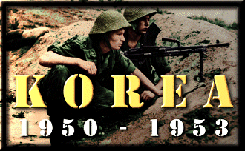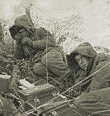Two Years for the Queen
By John Copsey Ex national serviceman Essex Regiment 1952-54
September 18th, 1952, a date forever engraved in my memory. I arrived at the training depot of the Essex Regiment at Warley Barracks, Brentwood, in the early afternoon joining a group of about 75 other lads, most looking as apprehensive as I was. After documentation came the issue of denims, boots and webbing. Did anybody apart from the few who had been army cadets have a clue what, went where? Then came the legendary haircut followed by an evening trying to bull new boots. What a job - would those pimples ever go? Later, we found out about hot shoe polish and the back of toothbrush handles, etc.
Next day started with us being assembled in a hollow square on the parade ground to be informed by the O.C. to pay good attention to our training, as after joining the Battalion for a few months we were all bound for Korea. I don't remember anyone jumping up and down with joy. The next 6 weeks seemed to last forever as the Army tried to turn us into soldiers. Drilling, polishing, range firing, polishing, P.T., polishing, and so it went on till at last we had our passing out parade and were deemed good enough to join the Battalion in Germany.
We arrived in Luneberg on a snowy evening in November and I joined A Coy. We were in some ex-German barracks and after the dilapidated barracks at Warley they were great. Showers in every block, plenty of hot water, they were like a palace. After a few weeks in the rifle company we were asked, yes asked, what we preferred to train as. We were given a choice of H.Q. Coy to train as signallers or we could join Support Company to train as mortar, M.M.G., anti-tank or assault pioneers. You could, of course, stay as a rifleman. I went to the signal platoon along with several of my mates who had trained at Warley with me. I think the course lasted about 12 weeks. We were taught the 88, 31, and the 62 wireless sets as well as line work, battery charging and other bits and pieces that make up a signaller's trade. I actually began to enjoy the signal work, which was interesting after all, the bull and drill.
We passed out as trained signallers and received our crossed flags. After the usual Battalion farewell parade we left Luneberg and the 7th Armoured Division for the barracks at Warley once again. H.Q. Coy was under canvas on the sports field as the barracks were not big enough to hold the whole Battalion; at least we didn't have to polish the floor. After a short leave we went to the battle range in Norfolk for our final battle exercises. It poured with rain most of the time I seem to recall. After a farewell parade through the streets of Chelmsford with drums beating, colours flying and bayonets fixed and a lunch at a local factory canteen, we went on final embarkation leave, except for a few unlucky souls who were sent to London to take part in the Coronation parade. It rained that day as well. After saying our tearful good-byes to friends and families, a couple of days later we marched from Warley Barracks to Brentwood station to board the train that was to take us to Southampton on the first leg of our journey to the Far East.
The Battalion boarded the troopship Asturias and sailed that evening, while a band played on the quay, just like the old black and white newsreels. The journey was a great experience. Seeing the Suez Canal and calling at Aden, Colombo, Singapore and Hong Kong. We were about 3 or 4 days sailing from Pusan, Korea, when over the ships tannoy the Colonel told us that a cease fire had been agreed and that he knew how disappointed we all were that the fighting had stopped and that we wouldn't be able to put into practice all our hard training. I don't know whom he was thinking of, because my mates and I were rather pleased we were not going to be shot at.
We docked at Pusan to a reception of an American band playing on the quay and some Korean dignitary giving flowers to the Colonel, which was highly amusing to us squaddies on the decks above. The Asturias stayed in Pusan to bring home the freed POWs a couple of weeks later. We entrained at Pusan onto a rather rough train with no glass in the windows, only chicken wire and wooden seats. The journey took about 24 hrs to the railhead some distance behind the front line. There we boarded American trucks for the last stretch to the reserve positions at the front. We were only there one night before we moved back to a new camp being constructed on the Kansas Line, which was to be the new fortified line below the D.M.Z.
I was allotted to B Coy as a wireless operator and on the first night there went on what was to become the regular patrolling of the south side of the Imjim River. For the first time we were issued with ammo and feeling like real soldiers at last set off. It was a bit scary at first. As the river flowed over the rocks it sounded like people wading across, and we spent some time waiting for someone to appear before we realized what it was.
It was very, very cold in the winter and the monsoon period was very wet and great care had to be shown when near the banks of the Imjim when it was in full flood. The summer patrols, although warmer, meant being eaten alive by mosquitoes, and the repellent cream seemed to do exactly the opposite. Getting out of sight and having a crafty cigarette kept them away for a few minutes. Mosquito nets were used for sleeping under in the summer but why was there always one that had crept in when you did and proceeded to buzz around your ears until you managed to put it to sleep permanently?
After a few months I was transferred to the telephone exchange, which although never having a complete day off, had a lot of bonuses, as we were left to organize ourselves and providing we behaved ourselves we were left alone to come and go as we pleased. The exchange at night in winter was a popular port of call for the lads on stag, as it was usually the warmest place in the Coy lines and if they timed it right they might be lucky enough to get a cup of char. The highlight of everyone's time out there was R & R in Tokyo. I was lucky enough to go there twice. A lot of us who went there will certainly never forget it for one reason or another. Ebishu Camp was a dream after Korea, with Japanese girls to make your bed and wait at the tables, you could even get your boots cleaned for a few pence. It was great there mixing with other U.N. troops in the bars out there and sharing a few beers.
I left Korea in June or July 1954 going first to Kure in southern Japan where the army had its base depot. There we boarded the troopship Dilwarrafor the journey home. I think we realized we were nearly home when we passed through the Suez and were greeted by the troops stationed out there shouting from the banks "You lucky B!!!!!!!s" and us calling back for them to get some in and asking how they got a home posting. We docked at Southampton in the evening. One lad had somehow got his girlfriend and family to be there when we docked and he was allowed off the ship to meet them for a while. The catcalls and cheers when they kissed on the quay, I should think, could be heard in London. We disembarked next morning with the ORs passing straight through customs while the officers were made to turn out their kit, much to our amusement. I cannot remember the train journey back to Warley but on arrival we were given weekend passes and were soon on our way home. We were demobbed a few days later.
As a footnote I must say for the first few months I really missed the lads and would have gone back in if they would have come with me.
John Copsey
Ex national serviceman
Essex Regiment 1952-54






